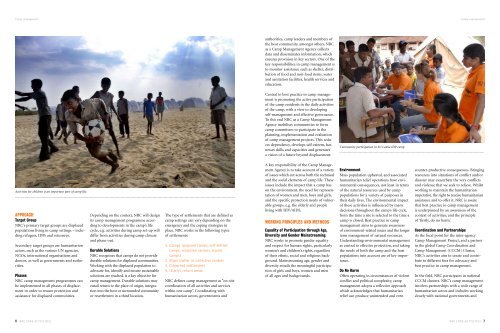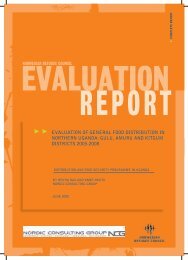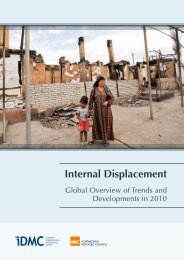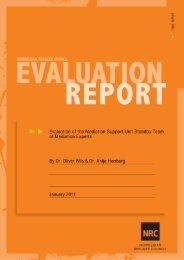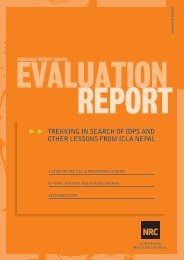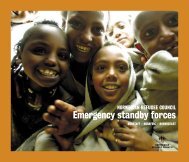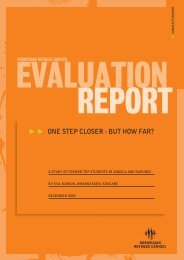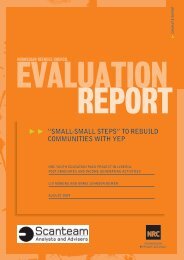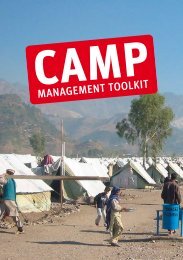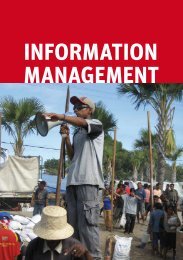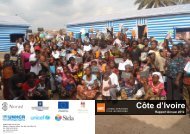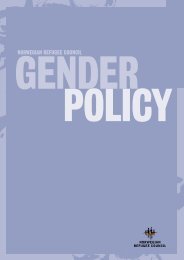Camp managementCamp managementauthorities, camp leaders and members ofthe host community, amongst others, <strong>NRC</strong>as a Camp Management Agency collectsdata and disseminates information, whichensures provision in key sectors. One of thekey responsibilities in camp management isto monitor assistance such as shelter, distributionof food and non-food items, waterand sanitation facilities, health services andeducation.Central to best practice in camp managementis promoting the active participationof the camp residents in the daily activitiesof the camp, with a view to developingself-management and effective governance.To this end <strong>NRC</strong> as a Camp ManagementAgency mobilises communities to formcamp committees to participate in theplanning, implementation and evaluationof camp management projects. This reducesdependency, develops self-esteem, harnessesskills and capacities and generatesa vision of a future beyond displacement.Community participation in Sri Lanka IDP campActivities for children is an important part of camp life.ApproachTarget Group<strong>NRC</strong>’s primary target groups are displacedpopulations living in camp settings – includingrefugees, IDPs and returnees.Secondary target groups are humanitarianactors, such as the various UN agencies,NGOs, international organisations anddonors, as well as governments and authorities.Phases<strong>NRC</strong> camp management programmes canbe implemented in all phases of displacementin order to ensure protection andassistance for displaced communities.Depending on the context, <strong>NRC</strong> will designits camp management programme accordingto developments in the camp’s lifecycle, e.g. activities during camp set-up willdiffer from activities during camp closureand phase-out.Durable Solutions<strong>NRC</strong> recognises that camps do not providedurable solutions for displaced communities.Working with the displaced population toadvocate for, identify and ensure sustainablesolutions are reached, is a key objective forcamp management. Durable solutions mayentail return to the place of origin, integrationinto the host or surrounded communityor resettlement in a third location.The type of settlements that are defined ascamp settings can vary depending on theemergency and the coping strategies inplace. <strong>NRC</strong> works in the following typesof settlements:1. Camps (planned camps, self-settledcamps, reception centres, transitcamps)2. Mass shelter in collective centres3. Dispersed settlements4. (Early) return areas<strong>NRC</strong> defines camp management as “on-sitecoordination of all activities and serviceswithin one camp”. Coordinating withhumanitarian actors, governments andA key responsibility of the Camp ManagementAgency is to take account of a varietyof issues which cut across both the technicaland the social elements of camp life. Theseissues include the impact that a camp hason the environment, the need for representationof women and men, boys and girls,and the specific protection needs of vulnerablegroups, e.g. the elderly and peopleliving with HIV/AIDS.Working Principles and MethodsEquality of Participation through Age,Diversity and Gender Mainstreaming<strong>NRC</strong> works to promote gender equalityand respect for human rights, particularlywomen’s and children’s rights, regardlessof their ethnic, social and religious background.Mainstreaming age, gender anddiversity entails the meaningful participationof girls and boys, women and menof all ages and backgrounds.EnvironmentMass population upheaval, and associatedhumanitarian relief operations have environmentalconsequences, not least in termsof the natural resources used by camppopulations for a variety of purposes intheir daily lives. The environmental impactof these activities is influenced by manydecisions throughout the camp’s life cycle,from the time a site is selected to the time acamp is closed. Best practice in campmanagement aims to generate awarenessof environment-related issues and the longerterm management of natural resources.Understanding environmental managementas central to effective protection, and takingthe needs of both the camp and the hostpopulations into account are of key importance.Do No HarmOften operating in circumstances of violentconflict and political complexity, campmanagement adopts a reflective approachwhich acknowledges that humanitarianrelief can produce unintended and evencounter-productive consequences. Bringingresources into situations of conflict and/ordisaster may exacerbate the very conflictsand violence that we seek to relieve. Whilstworking to maintain the humanitarianimperative, the right to receive humanitarianassistance and to offer it, <strong>NRC</strong> is awarethat best practice in camp managementis underpinned by an awareness of thecontext of activities, and the principleof ‘firstly, do no harm.’Coordination and PartnershipsAs the focal point for the inter-agencyCamp Management Project, and a partnerin the global Camp Coordination andCamp Management (CCCM) Cluster,<strong>NRC</strong>’s activities aim to create and contributeto different fora for advocacy andbest practice in camp management.In the field, <strong>NRC</strong> participates in nationalCCCM clusters. <strong>NRC</strong>’s camp managementinvolves partnerships with a wide range ofhumanitarian actors and includes workingclosely with national governments and6 <strong>NRC</strong> CORE ACTIVITIES <strong>NRC</strong> CORE ACTIVITIES 7
Camp managementCamp managementProjects examples:• The inter-agency Camp Management Toolkit 2008 publication,with the initial 2004 draft version, has been usedby over 50 organisations. <strong>NRC</strong> is the coordinator of theCamp Management Toolkit/Camp Management Project,which includes UNHCR, IOM, DRC, IRC, UNOCHA, and<strong>NRC</strong>.• The development of the inter-agency Camp ManagementTraining Roster, with over 60 stand-by staff trained andable to deliver camp management training.• Camp Management training and coaching materials fora wide range of stakeholders, including governments,camp communities and NGOs/international organisations/UNagencies.• Camp Management training delivered regionally andnationally, through the CCCM cluster and the CampManagement Project, in around 15 countries withseveral hundred participants.D.R. CongoNorthern UgandaSri LankaCamp Management training in Lebanon.authorities, in many aspects of camp administration.This includes the national authorities’responsibility for site selection anddesign for camps, ensuring security and thecivilian character of the camp, and provisionof documentation, and identificationof durable solutions to displacement.Another key partner in camp managementis the camp residents, who have representativeson the camp management team andare encouraged to form committees toidentify and advocate for the rights of thecommunity. Committee members arerepresentative of the camp population(according to gender, age and diversity),and meet regularly to identify key issuesand plan collective action to meet commonneeds.Camp Management ActivitiesThe <strong>Norwegian</strong> <strong>Refugee</strong> <strong>Council</strong> offerscamp management expertise and capacityin three key ways:· As a camp management agency inthe direct management of camps: Campmanagement is a holistic approach toensuring assistance and protection fordisplaced communities living in campsor camp-like situations. <strong>NRC</strong> campmanagers work with a wide range of stakeholdersto establish effective coordinationmechanisms, act as the camp residents’advocate, and promote the participationof the community in the life of the camp.· Through the provision of camp managementtraining and coaching: <strong>NRC</strong>recognises that well-trained staff, withthe necessary knowledge, skills and attitudesis central to the effective managementof camps. Likewise, training for a widerange of stakeholders, including governmentsand authorities, humanitarianactors, camp residents and members ofthe host community, contributes to raisingthe standard of living of displacedpeople. <strong>NRC</strong> provides camp managementtraining at regional, national and fieldlevel, coordinating a roster of inter-agencytrainers, and delivering training on behalfof the CCCM (Camp Coordination andCamp Management) Cluster, and theCamp Management Project (an interagencyinitiative which includes: UNO-CHA, UNHCR, IOM, DRC, IRC, <strong>NRC</strong>).Coaching programmes ensure follow-upto training, and on-going support forcamp communities in the developmentof self-management capacity.· Through camp monitoring: Campmonitoring means working to developcoordination bodies and systems in campsituations, and collecting and disseminatinginformation. This data can revealgaps where additional assistance orprotection is needed, and prevents theduplication of services. Monitoring takesplace throughout the phases of a camp’slife cycle: Its initial planning and set-up,the daily activities and care and maintenanceof the site, through to findingdurable solutions for the community,and the closure of the camp.Intensified fighting between theGovernment army and a number ofarmed groups resulted in increaseddisplacement and the establishmentof a number of camps in EasternD.R.Congo since 2006. Throughthe Camp Coordination and CampManagement (CCCM) workinggroup, <strong>NRC</strong> was designated as theCamp Management Agency for fourcamps – hosting nearly 50,000IDPs – around Goma in North Kivuin October 2007. In these camps,<strong>NRC</strong> aims at improving the livingconditions for, and protection of, theIDPs, by strengthening the capacitiesof the camp and host populations,and through on-site coordinationof several stakeholders working indifferent sectors in the camps.Weekly coordination meetings areorganised in each camp and campleadership structures are establishedwith representative participation ofthe different social groups.The armed conflict in NorthernUganda between the Governmentarmy and the LRA began more thantwenty years ago. It has resulted inthe displacement of more than 1.4million people, and crimes againstthe civilian population including theabduction of children, rape andtheft which have left communitiestraumatised by violence. <strong>NRC</strong> hascamp management field teams andoffices permanently based in twocamps called Amuru and Pabbo inAmuru district, in addition to campsin Kitgum district. <strong>NRC</strong>’s presenceaims to monitor and support thecurrent return process, as well asservice provision in still existingcamps. With the seeds of hope sownin recent peace talks, <strong>NRC</strong> is alsoworking to ensure protection forthe community in their transitionfrom life in the camp back to theirhomes and land; places of originwhich many children born insidethe camp, have never before known.Following multiple displacements asa result of both a protracted conflictand the 2004 tsunami, <strong>NRC</strong> worksin Sri Lanka’s North and Eastproviding assistance to camp communities.Maximising links betweencamp management, shelter andprotection monitoring projects,<strong>NRC</strong> has adopted a training approach.The aim is to build the skillsand self management capacitieswithin the numerous, small anddispersed settlements and camps.<strong>NRC</strong>’s presence has mobilised theelection of effective site leadershipand camp committees which meetregularly to identify and addressissues of concern in the community.8 <strong>NRC</strong> CORE ACTIVITIES <strong>NRC</strong> CORE ACTIVITIES 9


